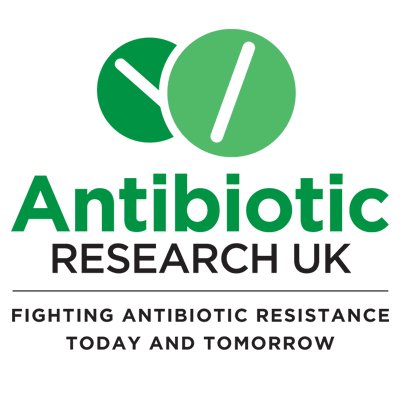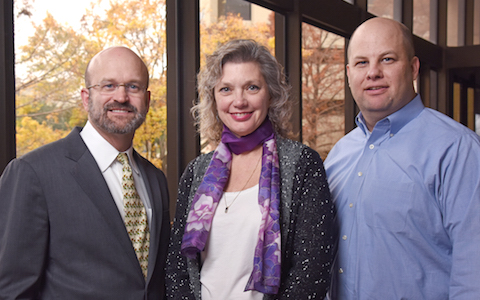Gram-negative bacteria
See the following -
First Research Programme Identifies Potential Antibiotic Resistance Breakers
 Antibiotic Research UK's first research programme finds a number of drugs that can break antibiotic resistance in Gram-negative bacteria. Antibiotic resistant infections are predicted to lead to 10 million deaths per year globally by 2050 at a cost of up to $100 trillion to the world economy. In the UK at least 5,000 people per year die from resistant infections. New research by Antibiotic Research UK (ANTRUK), the world's first charity created to develop new antibiotics in the fight against superbugs, has found Antibiotic Resistance Breakers (ARBs) in its first major lab research programme...
Antibiotic Research UK's first research programme finds a number of drugs that can break antibiotic resistance in Gram-negative bacteria. Antibiotic resistant infections are predicted to lead to 10 million deaths per year globally by 2050 at a cost of up to $100 trillion to the world economy. In the UK at least 5,000 people per year die from resistant infections. New research by Antibiotic Research UK (ANTRUK), the world's first charity created to develop new antibiotics in the fight against superbugs, has found Antibiotic Resistance Breakers (ARBs) in its first major lab research programme...
- Login to post comments
How We Could Kill Superbugs Without Antibiotics
 Antibiotics will soon be useless, but U.K. scientists have come up with a new way to kill bacteria—and it's not with a drug. And perhaps the best thing about this approach is that bacteria may not be able to build resistance against it. A team from the University of East Anglia, publishing in the journal Nature, figured out that the key to destroying bacteria is understanding how they build their defensive walls. It’s like ruining an astronaut’s space suit instead of going after the astronauts inside...
Antibiotics will soon be useless, but U.K. scientists have come up with a new way to kill bacteria—and it's not with a drug. And perhaps the best thing about this approach is that bacteria may not be able to build resistance against it. A team from the University of East Anglia, publishing in the journal Nature, figured out that the key to destroying bacteria is understanding how they build their defensive walls. It’s like ruining an astronaut’s space suit instead of going after the astronauts inside...
- Login to post comments
Killing Superbugs with Star-Shaped Polymers, not Antibiotics
 Tiny, star-shaped molecules are effective at killing bacteria that can no longer be killed by current antibiotics, new research shows. The study, published today in Nature Microbiology, holds promise for a new treatment method against antibiotic-resistant bacteria (commonly known as superbugs). The star-shaped structures, are short chains of proteins called ‘peptide polymers’, and were created by a team from the Melbourne School of Engineering...
Tiny, star-shaped molecules are effective at killing bacteria that can no longer be killed by current antibiotics, new research shows. The study, published today in Nature Microbiology, holds promise for a new treatment method against antibiotic-resistant bacteria (commonly known as superbugs). The star-shaped structures, are short chains of proteins called ‘peptide polymers’, and were created by a team from the Melbourne School of Engineering...
- Login to post comments
Pfizer Unveils ATLAS®, An Interactive, User-Friendly Website That Provides Global Antibiotic Resistance Surveillance Data Across 60 Countries
 Pfizer Inc. today announced the launch of the company’s Antimicrobial Testing Leadership and Surveillance (ATLAS) website, which is designed to provide physicians and the global health community with easy access to critical data on the efficacy of various antibiotic treatments and emerging resistance patterns across more than 60 countries. Understanding evolving bacterial resistance patterns is a key element in managing the rise of antimicrobial resistance. To that end, ATLAS can not only help physicians select the most appropriate treatment choices for their patients, but also enable global health authorities to develop data-driven antimicrobial resistance mitigation strategies...
Pfizer Inc. today announced the launch of the company’s Antimicrobial Testing Leadership and Surveillance (ATLAS) website, which is designed to provide physicians and the global health community with easy access to critical data on the efficacy of various antibiotic treatments and emerging resistance patterns across more than 60 countries. Understanding evolving bacterial resistance patterns is a key element in managing the rise of antimicrobial resistance. To that end, ATLAS can not only help physicians select the most appropriate treatment choices for their patients, but also enable global health authorities to develop data-driven antimicrobial resistance mitigation strategies...
- Login to post comments
Scientists Have Figured Out Why Drug-Resistant 'Superbugs' Are So Hard to Kill
You may have already heard about the growing problem caused by antibiotic resistance - the spread of superbugs that have evolved to become resistant to the antibiotics we usually attack them with. It's an issue that could have very serious implications for global health and disease if it isn't tackled urgently, and now researchers have made an important step in finding a solution. A new study has discovered how these drug-resistant bacterial cells maintain a defensive barrier, and if further research can find a way to bring down these walls - rather than targeting the bacteria directly - the bacteria could be prevented from developing drug resistance in the first place...
- Login to post comments
Study Identifies a Way to Prevent Burn Injury Infection – Without Antibiotics
 A new way to fight multidrug-resistant bacteria by blinding them rather than killing them proved highly effective in a model of burn injuries, UT Southwestern Medical Center research shows. “In the United States, there are more than 1 million burn injuries and 100,000 hospitalizations annually. Up to 75 percent of the mortality in burn patients is associated with infections, which are particularly common in patients who suffer extensive burns – those that cover 40 percent or more of the body,” said Dr. Steven Wolf, Section Chief for Burns and Professor of Surgery at UT Southwestern Medical Center...
A new way to fight multidrug-resistant bacteria by blinding them rather than killing them proved highly effective in a model of burn injuries, UT Southwestern Medical Center research shows. “In the United States, there are more than 1 million burn injuries and 100,000 hospitalizations annually. Up to 75 percent of the mortality in burn patients is associated with infections, which are particularly common in patients who suffer extensive burns – those that cover 40 percent or more of the body,” said Dr. Steven Wolf, Section Chief for Burns and Professor of Surgery at UT Southwestern Medical Center...
- Login to post comments
UEA Scientists Pave Way for New Generation of Superbug Drugs
 New research published today in the journal Nature reveals the mechanism by which drug-resistant bacterial cells maintain a defensive barrier. The findings pave the way for a new wave of drugs that kill superbugs by bringing down their defensive walls rather than attacking the bacteria itself. It means that in future, bacteria may not develop drug-resistance at all. Unravelling this mechanism could also help scientists understand more about human cell dysfunctions linked to disorders such as diabetes, Parkinson’s and other neurodegenerative diseases...
New research published today in the journal Nature reveals the mechanism by which drug-resistant bacterial cells maintain a defensive barrier. The findings pave the way for a new wave of drugs that kill superbugs by bringing down their defensive walls rather than attacking the bacteria itself. It means that in future, bacteria may not develop drug-resistance at all. Unravelling this mechanism could also help scientists understand more about human cell dysfunctions linked to disorders such as diabetes, Parkinson’s and other neurodegenerative diseases...
- Login to post comments